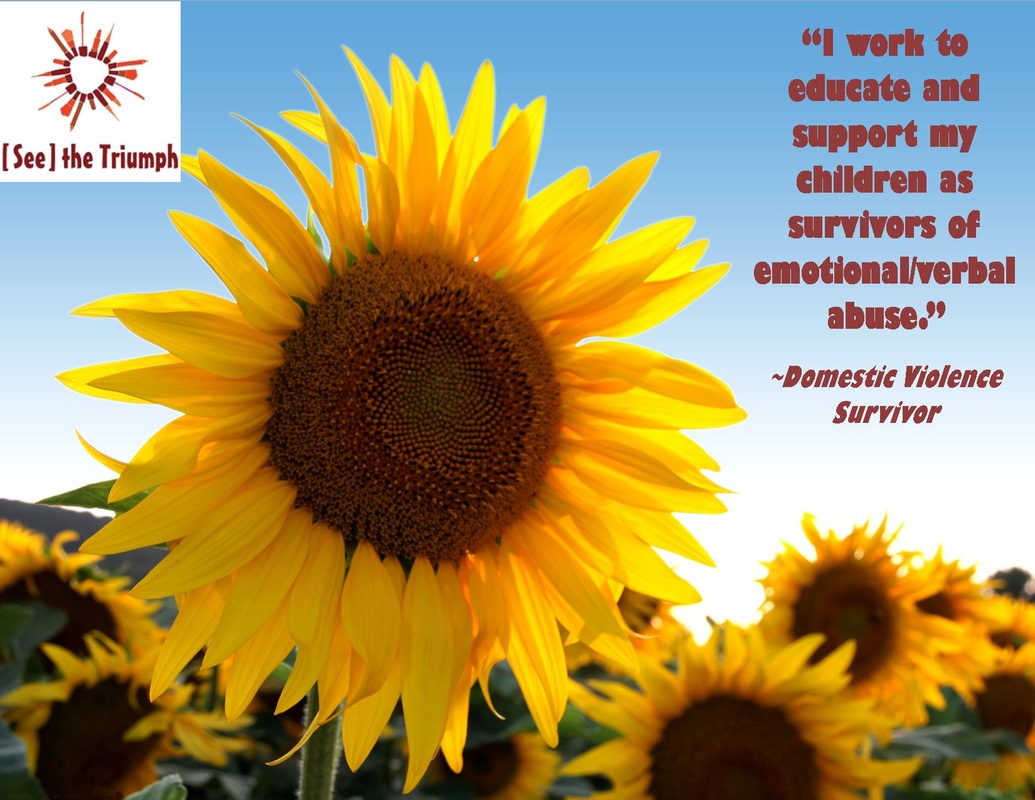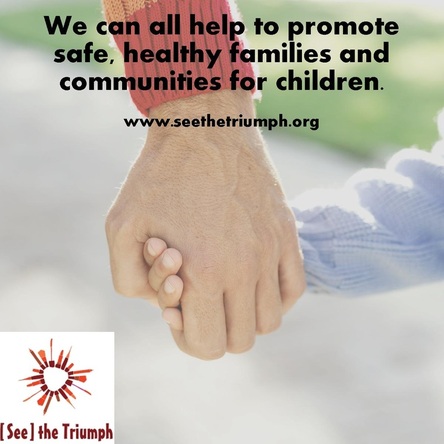|
7/27/2014 Their Little Eyes Are Watching By Heather Teater, See the Triumph Guest Blogger Children do not have to be the direct victims of abuse to be affected by domestic violence. Witnessing intimate partner violence can have a range of effects on a child or adolescent’s emotional and behavioral health. For example, children who have witnessed domestic violence have been found to have higher rates of PTSD, depression, and aggression than their peers. Witnessing intimate partner abuse has also been linked to decreased school functioning, increased risky behavior, and higher rates of future substance abuse (Wood & Sommers, 2011). With this knowledge, some might ask parents who are in abusive relationships why they don’t “just leave” their partners to save their children. However, it is not that easy and leaving is not always an immediate option. There are many circumstances that prevent men and women from getting out of abusive relationships. Perhaps most importantly, leaving can be dangerous and planning for safety is not an easy process. People who are in violent relationships are also often cut off from the support of friends and family. Violent partners may be in control of financial resources, leaving victims with only two options: stay with the perpetrator or leave with no money to survive. The victim may be dependent on an abusive partner in other ways as well, such as for medical insurance, access to transportation, or support for a disability. Having children may also make leaving more difficult. The victim has to find room for him- or herself and the children to stay, has to find the financial means to support multiple people, and has to plan for the safety of the whole family. Leaving is not a task that can be taken lightly and nobody should ever suggest that a victim of intimate partner violence should “just leave.” If you are unable to leave the violent situation at this time but have children who are witnessing the intimate partner abuse that is occurring in your household, there are steps you can take to help prevent them from suffering with long-standing effects. First and foremost, you should sit down with your children and a professional, if possible, to construct a safety plan for when violence is occurring in the presence of your children. Do you have a neighbor who would be willing to look after your children until the violent episode is over? If not, is there a safe place in or around your house to where your children can run when you and your partner begin to argue? Do your children know how to dial 911? Do they know your address? These are a few examples of what might be included in a safety plan. It is recommended that you create a personalized safety plan with a professional, but if you are unable to meet with a professional at this time, you can find a template for a safety plan here: http://www.ncdsv.org/images/DV_Safety_Plan.pdf . Be sure to keep this safety plan in a place where it is unlikely to be found by your partner. Your children may also benefit from receiving counseling. If you do not have your own insurance or are unable to afford counseling, look for a non-profit agency in your area where you can receive services at a free or discounted rate. Counseling can help your children develop new skills to cope with the violence occurring at home, with an ultimate goal of preventing any long-term effects. Just as it is important for you to build up your support system, it will also be helpful for your children to develop a support network of healthy friendships. More importantly, your children need to know that you love and care for them. Spending time with your children will help them know that while you are hurting, they are not at fault. Please note that if you decide to leave your violent relationship, most domestic violence shelters do provide shelter for children along with their parents. There are supports out there for you and your family. You and your children to not have to be victims anymore. You can find more information at the resources below. Resources
Reference
 Heather Teater recently completed her Master's degree in Couple and Family Counseling in the Department of Counseling and Educational Development at the University of North Carolina at Greensboro. By Christine Murray, See the Triumph Co-Founder
All this month, we’ve focused on parenting toward nonviolence. We couldn’t let this month end without addressing an important topic about children and violence. Today we’re focusing on how children are impacted when they experience domestic violence in their homes, and what steps can be taken to ensure that children are safe and supported. When children witness domestic violence in their homes, they face many potential challenges that may occur throughout their lives. There are many ways that children can be impacted when they’re living in a violent home. According to the New Hampshire Coalition Against Domestic Violence, these include being abused themselves in addition to witnessing violence, being used as part of abuse tactics the abuser uses, and by making it more difficult for the parent victim to parent effectively. Would you know the signs to indicate that a child you know has experienced domestic violence in their home? The organization, Children of Domestic Violence, provides a useful chart that shows that the indicators can show up in many ways in children’s lives, including their behaviors, emotions, and social relationships. In many jurisdictions, children witnessing domestic violence is considered a form of neglect and is required to be reported to Child Protective Services. The US Department of Health and Human Services, through its Child Welfare Information Gateway, provides a useful resource for understanding the laws in your area. It’s important for professionals and community members to know and understand their legal obligations, as well as resources for helping to support the children in their lives who’ve been impacted by domestic violence. My colleagues and I in the Family Violence Research Group at the University of North Carolina at Greensboro recently developed a safety planning resource, Safety Strategies, for professionals to use when working with clients impacted by domestic violence. We based this resource on a series of 9 focus groups that we conducted with professionals in domestic violence agencies to learn about safety risks and safety planning related to domestic violence. We heard some great information from the professionals in our focus groups that help us understand how to think about children’s safety in the context of domestic violence. First, the professionals reminded us that it’s important for parents (and other adults) ultimately to be responsible for children’s safety. Young children especially should not be expected to keep themselves safe. However, it’s possible to do some basic safety planning with children to help them learn ways to become safer if violence occurs. This safety planning must be done in a developmentally-appropriate manner, using words and behaviors that match the child’s capabilities and understanding of the situation. Some of the strategies that adults can review with children include how to call 9-1-1 and developing a code word or sign to let neighbors or others know that they need help. It’s also important to help children connect with adults and friends with whom they can talk and share their feelings. This may be a non-offending parent, an extended family member, a teacher, neighbor, coach, or other trusted adult. Children also may benefit from counseling, especially play therapy, to help them process their emotional responses to the domestic violence. Children who have experienced violent homes need a lot of support and resources, including positive, trusting relationships with supportive adults, opportunities to be involved in activities where they can discover their strengths, connections with peers and community organizations, and relationships in which they can tell their stories and feelings. We can all help to promote safe, healthy families and communities for children. If you’re interested in learning more, I encourage you to connect with our partner, the Stop Abuse Campaign, in their campaign to give children the right to a safe home to grow up in. |
Archives
July 2024
CategoriesAll About Intimate Partner Violence About Intimate Partner Violence Advocacy Ambassadors Children Churches College Campuses Cultural Issues Domestic Violence Awareness Month Financial Recovery How To Help A Friend Human Rights Human-rights Immigrants International Media Overcoming Past Abuse Overcoming-past-abuse Parenting Prevention Resources For Survivors Safe Relationships Following Abuse Schools Selfcare Self-care Sexual Assault Sexuality Social Justice Social-justice Stigma Supporting Survivors Survivor Quotes Survivor-quotes Survivor Stories Teen Dating Violence Trafficking Transformative-approaches |
Search by typing & pressing enter




 RSS Feed
RSS Feed